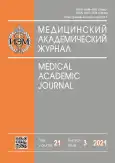Amphotericin b effect on the sensitivity to influenza infection of WI-38 VA-13 cells with IFITM3 gene knockout
- Authors: Koryabina K.S.1,2, Sergeeva M.V.1,3, Komissarov A.B.1,3, Eshchenko N.V.3, Stepanov G.A.3
-
Affiliations:
- Smorodintsev Research Institute of Influenza
- St. Petersburg State Institute of Technology
- Institute of Chemical Biology and Fundamental Medicine of SB RAS
- Issue: Vol 21, No 3 (2021)
- Pages: 109-112
- Section: Conference proceedings
- URL: https://journal-vniispk.ru/MAJ/article/view/76106
- DOI: https://doi.org/10.17816/MAJ76106
- ID: 76106
Cite item
Abstract
BACKGROUND: The application of CRISPR/Cas9 is one of the most rapidly developing areas in biotechnology. This method was used to obtain clones of а human origin cell line with knockout of one or more genes of the IFITM family, representing host restriction factors for influenza infection. Amphotericin B has previously been shown to promote influenza infection by blocking IFITM3 function.
AIM: The aim of this study was to evaluate the effect of amphotericin B on the sensitivity of IFITM knockout cells to influenza A virus infection.
MATERIALS AND METHODS: WI-38 VA-13 cells and mutant clones with IFITM3 knockout (F3 clone) or IFITM1, IFITM3 knockout (clone E12) were infected with influenza virus A/PR/8/34 (H1N1) in the presence or absence of amphotericin B. Forty-four hours after infection, the culture medium was taken to determine the infectious activity of the virus by titration in the MDCK cell culture, as well as the hemagglutinating activity of the virus. The infected cells were stained with fluorescently labeled antibodies against the viral NP protein, and the number of NP-positive cells was determined by flow cytometry.
RESULTS: The addition of amphotericin B increased the hemagglutinating and infectious activity of the virus in WI-38 VA-13cells, while the difference was insignificant for clones with IFITM gene knockout. A similar dependency was obtained for the percent of infected cells.
CONCLUSIONS: Mutant cells with a knockout of one or several genes of the IFITM family were equally susceptible to influenza infection regardless of the addition of amphotericin B, which confirms the crucial importance of a defect in the IFITM3 protein in increasing the permissiveness of cells to influenza A virus.
Full Text
##article.viewOnOriginalSite##About the authors
Kira S. Koryabina
Smorodintsev Research Institute of Influenza; St. Petersburg State Institute of Technology
Author for correspondence.
Email: kira336@yandex.ru
student
Russian Federation, Saint PetersburgMariya V. Sergeeva
Smorodintsev Research Institute of Influenza; Institute of Chemical Biology and Fundamental Medicine of SB RAS
Email: mari.v.sergeeva@gmail.com
ORCID iD: 0000-0003-0411-9896
SPIN-code: 9720-5812
PhD (Biol.), Leading Researcher at the Laboratory of Vector Vaccines
Russian Federation, Saint Petersburg; NovosibirskAndrey B. Komissarov
Smorodintsev Research Institute of Influenza; Institute of Chemical Biology and Fundamental Medicine of SB RAS
Email: a.b.komissarov@gmail.com
ORCID iD: 0000-0003-1733-1255
SPIN-code: 3792-8290
PhD (Biol.), Head of the Laboratory of Molecular Virology
Russian Federation, Saint Petersburg; NovosibirskNataliya V. Eshchenko
Institute of Chemical Biology and Fundamental Medicine of SB RAS
Email: eschenko96@gmail.com
Researcher at the Laboratory of Genomic Editing
Russian Federation, NovosibirskGrigoriy A. Stepanov
Institute of Chemical Biology and Fundamental Medicine of SB RAS
Email: stepanovga@niboch.nsc.ru
ORCID iD: 0000-0003-3393-3192
SPIN-code: 8587-2044
PhD (Chem.), Senior Researcher, Head of the Laboratory of Genomic Editing
Russian Federation, NovosibirskReferences
- Feeley EM, Sims JS, John SP, et al. IFITM3 inhibits influenza A virus infection by preventing cytosolic entry. PLoS Pathog. 2011;7(10):e1002337. doi: 10.1371/journal.ppat.1002337
- Lin TYu, Chin CR, Everitt AR, et al. Amphotericin B increases influenza A virus infection by preventing IFITM3-mediated restriction. Cell Rep. 2013;5(4):895–908. doi: 10.1016/j.celrep.2013.10.033
- Stepanov GA, Sergeeva MV, Mozhaeva AE, et al. Sozdanie i izuchenie kletochnykh linii s CRISPR/Cas9-napravlennym nokautom individual’nykh genov dlya povyshennoi produktsii virusa grippa. Proceedings of The Vserossiiskaya mul’tikonferentsiya s mezhdunarodnym uchastiem “Biotekhnologiya – meditsine budushchego”; 2019 2 June – 2 July; Novosibirsk. Novosibirsk; 2019. P. 215. (In Russ.)
Supplementary files








